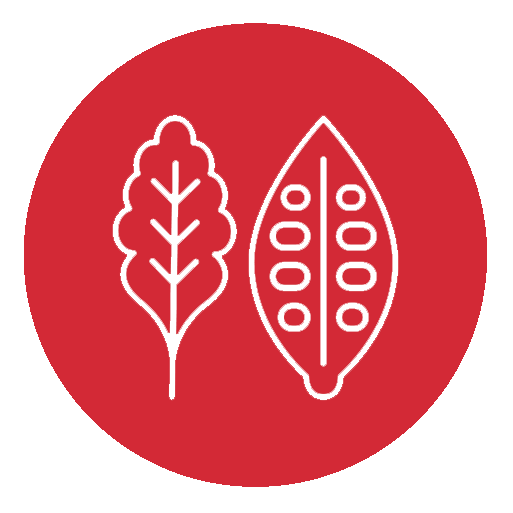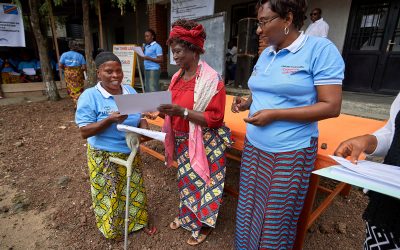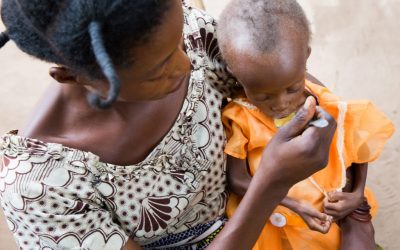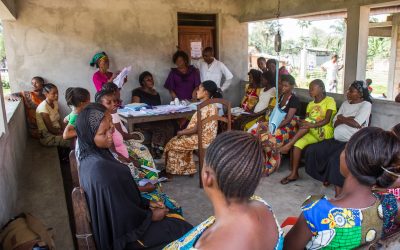
IMA World Health
in the Democratic Republic of COngo
Since 2000, IMA has worked alongside the Congolese government, donors and an array of local and international partners to revitalize the country’s health system, fight diseases and improve the health for a population in desperate need. Such long-term investment in the Democratic Republic of Congo has required resilience, creativity, and an incredible network of staff and partners to navigate successive armed conflicts, political instability, impassable roads and other obstacles that continue to threaten the health and well-being of the population.
IMA is proud to be a part of the team that is changing the narrative and the trajectory of health care in the DRC. Powered by partnership, new technologies are solving stubborn problems, successes are scaling up into widespread solutions and—most importantly—our vision of health, healing, and well-being for all is becoming more of a reality in the DRC every day.
IMA DRC PROJECTS
All of IMA DRC’s projects are structured around the World Health Organization’s Six Pillars of Health System Strengthening. Larger projects like the UK aid-funded ASSP focus on every aspect of improving the health system and reducing morbidity and mortality in women and children under five. Whereas others impact only one or two pillars like the USAID funded Tushinde which focuses on sexual and gender-based violence.
Support for the Health System
In French, ASSR stands for Appui au Système de Santé en RDC, which translates into Health Systems Support in DRC. It is an 18-month project funded by the Department for International Development using UK aid that is building on the accomplishments of the recently completed Accès au Soins de Santé Primaire, known locally as ASSP, which was also funded by UK aid and was implemented during the preceding six years.
Project Goal
The overall project goal is to improve the health of women, adolescents, and children through support for disease prevention, delivery of health care and health systems strengthening. It is structured around the six pillars of health systems strengthening, specifically: enhanced health service delivery and quality, improved and sustained human resources, enhanced and appropriate use of medicines and technologies, increased affordability of health services, enhanced health information systems and, lastly, enhanced leadership and governance.
ACCESS TO PRIMARY HEALTH CARE
Accès aux Soins de Santé Primaires, or ASSP, aimed to strengthen priority interventions such as the treatment of malaria, pneumonia and diarrhea; nutrition; obstetric and neonatal care; family planning; immunization; and water, sanitation and hygiene that are delivered through the health system. These intervention packages focused on improving the health of the mother, newborn and child. ASSP supported an estimated 9.7 million people across 52 health zones in five provinces (Kasai, Kasai Central, Maniema, North Ubangi and Tshopo).
The program had a massive impact across a wide variety of indicators, as ASSP exceeded program targets by an average of 6 percent. Between 2012 and 2019:
- ASSP completed 286 health centers, including 109 new constructions and 177 completed renovations,
- 26 million people visited these health centers for curative consultations,
- 1.85 million births were attended at health facilities,
- 1.7 million children were vaccinated against measles,
- 2.29 million bed nets were distributed and tracked,
- ASSP provided 1.6 million pregnant women with two doses of intermittent preventive treatment in pregnancy.
HEALTH SYSTEMS STRENGTHENING
EBOLA
Ebola Virus Disease (EVD) in North Kivu and Ituri: Strengthening Community Prevention, Response, and Recovery
The current Ebola outbreak remains the largest known outbreak in the DRC and the second-largest global outbreak. As of January 2020, there have been more than 3,417 cases and 2,240 deaths. Since the outbreak began in August 2018 it has spread to four provinces and 28 health zones. Ongoing and recent security incidents threaten to contribute to the increasing incidence of the disease. The USAID/OFDA project implementation environment presents significant challenges for conducting effective surveillance and monitoring of persons exposed to Ebola, disseminating key messages to reduce the risk of transmission, and ensuring facilities possess the supplies and infrastructure they need to screen patients and prevent infection.
Program Overview
The USAID/OFDA EVD in North Kivu and Ituri program is a comprehensive EVD prevention and response program. It addresses the issues of impeded access to health services, lack of trust and communication around the disease, and inadequate prevention and control measures in 10 health zones of the Eastern DRC. With its partners Tearfund and local non-governmental organization, Programme de Promotion des Soins de Santé Primaires, or PPSSP for short, IMA implements a four-prong program that addresses urgent needs to end the Ebola epidemic:
- Community outreach and mobilization with MOH/UNICEF-supported outreach teams, in which trained Community Health Workers (CHWs) (relais communautaire) provide evidence-based EVD prevention and treatment messaging and enhanced surveillance in their communities.
- Contact tracing, in association with MOH/WHO-supported Surveillance Teams, where trained CHWs support formal surveillance team visits to households of index clients and conduct contact tracing.
- Health facility-based infection prevention and control (IPC), which equipped 76 health facilities with IPC prevention materials (including provision of personal protective equipment [PPE]) and provides supportive supervision and oversight to ensure compliance with IPC procedures.
- Water, Sanitation, and Hygiene (WASH) and waste management support in health facilities, which includes rapid and cost-effective refurbishment and repairs to WASH infrastructure.
Ebola Virus Disease in North Kivu and Ituri – Phase 2
PROGRAM OVERVIEW
The current outbreak of Ebola in Eastern DRC is occurring in the midst of widespread insecurity, impeded access to interior health zones, and increasing distrust of international NGO and relief agencies. This environment presents significant challenges for effective surveillance and monitoring of persons exposed to Ebola. It also inhibits the dissemination of key messages to reduce the risk of transmission and stigma. Furthermore, equipping rural health facilities with essential prevention measures such as Water, Sanitation and Hygiene, also know as WASH, waste management, and effective infection prevention and control material and protocols, or IPC, has become increasingly difficult.
IMA and its partners Tearfund, Program for the Promotion of Primary Health Care (PPSSP), and Heal Africa are implementing a community-based and sustainable approach to address the issues of impeded access, lack of trust and communication, and inadequate IPC measures in 76 strategic health facilities in 63 of the most affected and most at-risk health areas currently affected by the Ebola outbreak.
Tushinde Ujeuri
In the DRC’s eastern region, about one in three women report being victims of SGBV. Following on the successes of IMA’s Ushinde Project, Tushindi Ujeuri’s overarching project goals are to strengthen community-based prevention of and response to gender-based violence, or GBV, effectively reduce GBV incidence and improve the quality of and access to holistic care for survivors, particularly among vulnerable groups including LGBTQI and Trafficking in Persons, or TIP, survivors.
In addressing GBV in Eastern DRC, Tushinde works in an integrated manner across three outcomes:
Outcome 1: Target Communities Demonstrate Greater Acceptance of Positive Gender Roles;
Outcome 2: Availability of community-level GBV-related services improved;
Outcome 3: Perceptions of stigma surrounding reintegrated survivors reduced.
Ushinde Project
Sexual and gender-based violence, or SGBV, remains a significant and endemic problem in the DRC and is exacerbated by the ongoing conflict in the central and eastern regions of the country. The Ushindi program, which means “to overcome” in Swahili, was a $20 million U.S. Agency for International Development cooperative agreement to implement comprehensive approaches to SGBV, in eastern DRC. The project implementation period was from 2010 to 2017 and worked in 10 health zones and 108 health areas with a target population of 1,592,198.
SGBV RESPONSE THROUGH POST-EXPOSURE PROPHYLAXIS KIT PROCUREMENT AND DISTRIBUTION PHASE II
Sexual and gender-based violence, or SGBV, remains a significant problem in the DRC. The 2013 DRC Demographic and Health Survey found that more than 57 percent of women in DRC experienced physical or sexual violence at some point in their lives. Post-exposure prophylaxis kits, or PEP kits for short, reduce a survivor’s risk of contracting HIV and other sexually transmitted diseases. Access to this critical intervention is uneven and challenging. According to DHIS2 data collected in the first quarter of 2017 to 2018, nearly 25 percent of health facilities in DRC failed to provide PEP kits to SGBV survivors, even when eligible cases presented for services. Baseline data collected by IMA in September 2018 for its previous OFDA-funded PEP Kit Procurement project showed that access to PEP kits remains quite low, particularly in areas affected by armed conflict. Unfortunately, these are also the areas that need PEP kits the most.
There are many variables that affect the availability of PEP kits. SGBV reporting, including PEP kit stock out data, remains low, with less than 50 percent of reports filled to completion. This is well below the national minimum standards of 80 percent. In addition, most health facilities receive different PEP kit components separately and assembly is never completed, which makes tracking stockouts difficult. During the first PEP Kit Procurement Project IMA identified the absence of health care providers trained in SGBV survivor care in several facilities, likely contributing to limited access to PEP kits.
Project Goal
To address these issues, the project will employ a multipronged PEP kit supply and distribution strategy, which will increase access, reduce stock-out, reduce cost per kit through a cost-effective local kitting solution, and reduce PEP kit waste through training of health care providers coupled with a robust tracking and monitoring system. Specifically, the approach will include bulk drug procurement, in-country kitting, quantification, warehousing and distribution, training of health care providers, and PEP kit monitoring and tracking. Through this holistic approach to PEP kit supply, the intervention will effectively address the PEP kit supply in DRC by allowing internal redistribution of PEP kits, which will, in turn, reduce stock out and massive losses due to under consumption in areas where early treatment remains very low.
POST-EXPOSURE PROPHYLAXIS KIT PROCUREMENT
Sexual and gender-based violence, or SGBV, remains a significant and endemic problem in the DRC and is exacerbated by the ongoing conflict in the central and eastern regions of the country. PEP kits reduce a survivor’s risk of contracting HIV and other sexually transmitted infections. Access to these critical treatments has been uneven and challenging. According to DHIS2 data collected at health centers, nearly 25 percent of health facilities in the country failed to provide PEP kits to some SGBV survivors from 2017 through the first quarter of 2018. This was true even when eligible cases presented for services.
PROJECT GOAL
The Post-Exposure Prophylaxis Kits Procurement Project, funded by the Office of U.S. Foreign Disaster Assistance, or OFDA, and implemented by IMA World Health, aimed to improve the supply chain for PEP kits in 16 provinces that all experienced a high prevalence of SGBV. A baseline assessment revealed that approximately 90 percent of health facilities across these 16 targeted provinces experienced a PEP kit stock-out that lasted longer than a week during the period of January to June 2018.
From July to October 2019 IMA facilitated access through the distribution and supply of 17,839 PEP kits in all 16 targeted provinces. The remaining 15,331 kits that were not supplied to health facilities due to procurement delays will be transferred to the new OFDA-funded PEP kit project, upon OFDA’s approval, and distributed to facilities by IMA, along with kits from the follow-up OFDA award.
SEXUAL AND GENDER-BASED VIOLENCE
IMA DRC Programs
The IMA DRC programs listed below often build upon the success of several projects and have continued to operate in some form over the course of many years, receiving funding from several consecutive projects.

Nutrition

Family Planning

Infrastructure & Construction

WASH
Medicine

Safe Deliveries
Immunizations
Improving Access
Hospital Management

DHIS2

Malaria
Clean Cookstoves
Community Health Endowments

Leadership & Governance
Gender & SGBV

Behavior Change Communications
improving health for 9.7 million people in the DRC.
From 2013 to 2019, ASSP supported an estimated 9.7 million people across Kasai, Kasai Central, Nord Ubangi, Maniema and Tshopo provinces, providing life-saving services to more than 10 percent of the total population of the DRC. Many of these people are continuing to reap the benefits of a growing and thriving health system through ASSR.
Health Areas
Health Zones
Provinces
IMA DRC Leadership
26 million patients have visited our health centers and community care sites for curative consultations.
Our Partners
IMA DRC's projects are implemented by a consortium of organizations that work together at all levels of the health system to implement nutrition, obstetric and neonatal care, family planning, immunization as well as water, hygiene and sanitation interventions. Read MoreRecent News
Saved by my Son: A Tushinde Ujeuri Success Story
"The support from the Tushinde program has restored my will to live." Tushinde Ujeuri Project brings hope to one survivor of sexual and gender-based violence in DRC It was mid afternoon, and my 10 year-old son and I were walking home from working in the fields. When...
Combatting Malnutrition in DRC: A Nutrition Success Story
Community relays in Ndesha, Kasai Central are successfully combatting malnutrition in the DRC thanks to ASSP's nutrition training. Combatting Malnutrition One Maman at a TimeMado Betu was a young child of two years and four months but was frail and unable to walk when...
Implant Method in DRC: A Family Planning Success Story
Spreading the Word about the Implant Method in DRC.News is spreading about the implant method in DRC. The families featured in this article are partly to thank. The stories below are just a snapshot of the impact the implant has made on the lives of families using the...
Implants Create Opportunity in DRC: A Family Planning Success Story
Julienne is one of the many women we celebrate during International Women’s Month. She is a shining example of how implants create opportunity in DRC. She is a 43-year-old mother of four and a force to be reckoned with! Julienne and her husband had three children when...
Safe Delivery App Helps Health Workers Respond To Emergencies In DR Congo
Dr. Nancy Bolan knows how important it is for health workers to have up-to-date information when responding to a maternal or newborn emergency at a clinic in the Democratic Republic of Congo. While serving as a deputy country director for IMA World Health in DRC from...
A Hotline In DR Congo Connects People With The Ministry Of Health
In the Democratic Republic of Congo, IMA World Health works with the Ministry of Health to create solutions to challenges that arise while ensuring access to primary health care services for more than 8 million people. One of the solutions created through the Access...
Contact IMA World Health
QUICK CONTACTS
Recent Posts
Quarter 1 Results
Number of pregnant women who received three doses of IPT while attending antenatal care: 58,495Number and percentage of 1-yr-old children vaccinated against measles: 78,123Number of Couple Years of Protection (CYPs) achieved through family planning service provision:...
Saved by my Son: A Tushinde Ujeuri Success Story
"The support from the Tushinde program has restored my will to live." Tushinde Ujeuri Project brings hope to one survivor of sexual and gender-based violence in DRC It was mid afternoon, and my 10 year-old son and I were walking home from working in the fields. When...
Combatting Malnutrition in DRC: A Nutrition Success Story
Community relays in Ndesha, Kasai Central are successfully combatting malnutrition in the DRC thanks to ASSP's nutrition training. Combatting Malnutrition One Maman at a TimeMado Betu was a young child of two years and four months but was frail and unable to walk when...











